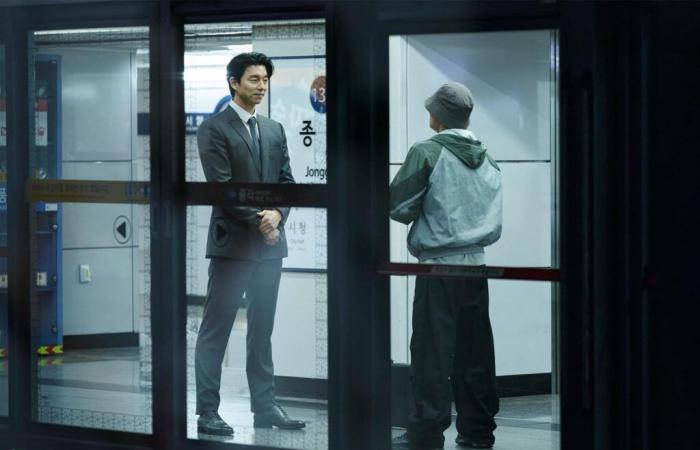Raise your hand if you’ve been personally victimized by Gong Yoo—or, better yet, if you’d still like to be after watching the first episode of Squid Game Season 2. Fans of the first season of Squid Game—Netflix’s überviolent South Korean drama series that became a global phenomenon—might remember the character known as the Salesman or the Recruiter; he’s the dapper guy in the suit, played by famous South Korean heartthrob Gong Yoo, who embodied the first glimpse of the brutal anti-capitalist metaphor at the heart of the show by slapping down-on-their-luck losers of dakji in subway stations. The Recruiter (and Gong Yoo) quickly became the internet’s new “problematic fave”—a natural conclusion for a character who uses physical violence to test the limits of future Squid Game players’ desperation, while looking like, and embodying, the charisma of one of today’s most swoon-worthy actors. Though he had only a few minutes of screen time in Season 1, the Recruiter went on to inspire articles with iconic headlines like Vulture’s “So You Want Gong Yoo to Slap You. Now What?” To answer that question, you can now watch Gong Yoo flex his acting chops in a more expanded role in the first episode of Squid Game Season 2, “Bread and Lottery.”
Season 2 of Squid Game picks up right where we left off, with Player 456, Seong Gi-hun (Lee Jung-jae), choosing to use his freshly won fortune to go after the organizers of the games instead of reuniting with his daughter. Now Gi-hun is back in the games, but this time he joins in an attempt to kill the leader known as the Front Man, theoretically chopping the head off the Squid Games hydra and ending the games for good. During his pursuits, we meet another cast of desperate characters competing for money to help them out of their predicaments. Meanwhile, our good cop from Season 1, Jun-ho (Wi Ha-joon), joins Gi-hun in his plot to take down the organization but without revealing that he did, in fact, find the Front Man in the Season 1 finale—who just so happens to be Jun-ho’s long-lost brother In-ho. Where Season 1 wrestled with the depravity caused by capitalism, Season 2 ponders if one man can lead a revolution to stop it. But because the show was renewed for a second and third season early on, it’s clear that we’ll have to wait till at least Season 3 to see if Gi-hun successfully manages to become the hero he always envisioned himself to be.
However, we don’t get to all of this without first reencountering our favorite suited, game-loving baddie. The Recruiter is Gi-hun’s only lead to getting an audience with the Front Man, so Gi-hun has spent the two years since he won the games tracking the Recruiter down by hiring the same loan sharks he was indebted to in the first season to search every subway station, every single day, for a man in a suit with a fancy briefcase who slaps people while playing a children’s game. That is, until the head of the loan sharks, Mr. Kim (Kim Pub-lae), and his second-in-command, Woo-seok (Jeon Seok-ho), finally find him.
This time, we see the Recruiter go aboveground to buy some bread and lottery scratch-offs. He then goes to a park and offers the unhoused and impoverished a choice: the lottery ticket or the bread. When dozens choose the lottery cards, the Recruiter—in a great moment of ruthlessness played so mundanely by Gong Yoo that it reads as dark humor—offers each a coin to scratch their cards but demands it back when they all lose. He then stands in the center of the park and dumps all of the unclaimed bread on the ground. With a high-angle shot showing the 6-foot actor towering over those he deems lesser-than, he tells them, “I’m not the one who threw these away—it was you, ladies and gentlemen,” before stomping on the bread pile. He jumps on it, throwing what looks like a tantrum, his fancy shoes nearly slipping on the glutinous mush as he yelps from exertion. It’s the first time we see him lose his composure, before he smooths his hair back and repositions his suit with Jokerlike glee after he’s done. Not to worry, though. Soon, he will go full clown.
The Recruiter ends up apprehending both Mr. Kim and Woo-seok, tying them up and forcing them to, of course, play a game. The game is a modified version of Rock, Paper, Scissors, and the loser must then face their odds on the other end of the Recruiter’s revolver in a game of Russian roulette. It isn’t until the Recruiter finally gets his kill—when Mr. Kim sacrifices himself for Woo-seok—that he seems satisfied. He quickly finds Gi-hun’s hideout, where he awaits the vengeful winner while nonchalantly drinking banana milk. It’s upon Gi-hun’s arrival that we get the backstory of this psychotic villain, which is, surprisingly, Gong Yoo’s first time playing the type. He started as a worker in the games, removing and burning the bodies of those who lost, seeing them as “just trash, utterly useless in this world.” After working hard for some years, he got promoted to masked executioner. Then, while killing people during the games, he came face-to-face with his father, who had lost and was begging him to save his life. He brags to Gi-hun about shooting his father without hesitation, realizing then that he was “cut out for this job.”
What angers the Recruiter, who seems immovable in the face of Shakespearean-level tragedy, is Gi-hun’s believing he’s special or, more broadly, that human life is special at all. When Gi-hun continuously refers to the Recruiter as a dog, Gong Yoo expertly portrays a man whose favorite place to be is on the verge of losing his mind. The Recruiter challenges our hero to another game of Russian roulette, this time without spinning the revolver and resetting the odds. Each man passes the gun between them and pulls the trigger. One of them will die within six attempts, though the Recruiter looks as if he’s on a high.
The exhilarating face-off between Gi-hun and the Recruiter that ends the first episode is about not who will win (we know that star actor Lee Jung-jae is in the season for the long haul) but the kinds of humanity that can exist in these systems—the kinds that keep the systems going. Squid Game is about regular-degular humans with morals who either stick to them or forgo them for cash or power—or who have left their morals behind for so long that they’ve forgotten them completely (like the Frontman, In-ho). It’s a story about how capitalism creates these kinds of people and scenarios, amplified even further this season by the presence of a former crypto-influencer YouTuber who persuaded his followers to invest in a cryptocurrency that crashed, leaving him and plenty of his followers (some of whom are stuck in the games with him) in massive debt.
But the show benefits from having characters whose morals are reigned not by understandable circumstances or character development but by a different set of rules: chaos for chaos’s sake. Or, in the case of the Recruiter, just the opposite: someone who loves clarity—winners and losers deemed so by simple, governable terms that can’t be argued, discounted, or misconstrued. He loves odds, even if they’re stacked against him.
When it’s clear that the Recruiter will lose, Gi-hun repeats the suited man’s taunting words back to him, giving him an out if he’ll admit that he is “nothing more than their dog.” Instead, the Recruiter just smiles, the satisfaction of a deranged job well done played out on Gong Yoo’s face before he hastily and shakily places the gun under his chin and fires. The Recruiter is the most captivating character not just because he’s handsome or because he’s Gong Yoo—though those two things do play a crucial role in his ability to get people to trust him enough to play his silly games—but because his character’s motivations are less complicated. Ruled by chaos, villains with codes are intriguing, even if they’re destructive. There’s something so striking about someone with a different sense of ethics who wasn’t bullied, beaten, and broken into being that way but was born under a different understanding of life’s accepted parameters.
Starting the season with the Recruiter’s story is poignant for the show’s central metaphor as well. It gives the show the chance to, at the outset, underline Gi-hun’s point that they’re all still slaves to the game and its organizers, whether they’re holding a gun or an invitation to play. As a metaphor for capitalism, the Recruiter’s story reminds us that no matter how far we work our way up the ladder of the system, if we’re not in the VIP room, we’re being taken advantage of. Gi-hun reminds the Recruiter that, in the end, they’re all being exploited—that is the great equalizer. It’s just a shame we had to lose Gong Yoo to see it.






